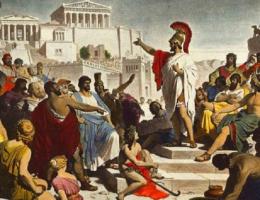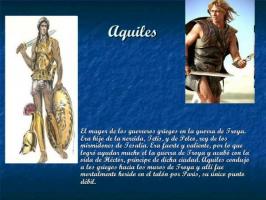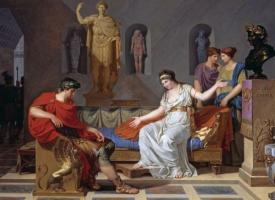Octavian, Roman Emperor - Biography
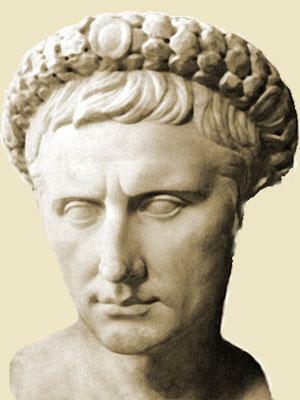
Image: ArqueHistoria
The Roman Empire has had, without a doubt, a long history that includes from the year 27 a. C. which is when the empire was founded, until the year 476 d. C. when the disintegration of the Western Roman Empire takes place. During this stage, Rome was ruled by emperors who concentrated in their person all the powers, that is, the political, administrative, religious and military.
Next, in this lesson from a TEACHER we offer you a short biography about Octavian, the Roman emperor who was the one who forged the empire as such, and it is that he was the first Roman emperor and therefore who carried out the form of government that later his successors followed.
Index
- Early years of Octavian, Roman Emperor
- Cesar's death and first conflicts
- Second Triumvirate
- The Marco Antonio War and his arrival in power
- Death of Octavio Augusto
Early years of Octavian, Roman Emperor.
Cayo Octavio Turino He was born on September 23, 63 BC. C. in the city of Rome, although he was raised in Velletri, the birthplace of his father, also called Gaius Octavian, who was the governor and praetor of Macedonia,
his mother, Acia, it was nothing more and nothing less than niece, by Julio Cesar. For the year 59 a. C. Octavio's father dies, being orphaned when he was only four years old, and his mother married Lucio Marcio Filipo, who claimed to be a descendant of Alexander the Great.Octavio was raised by his maternal grandmother until 51 BC. C. which was when she died, and from that moment on, his mother and his stepfather, Filipo, were the ones in charge of giving her a tougher education for years to come, so much so that only four years later he was invested with the virile toga, a year before he was established, thus demonstrating his premature maturity.
For the year 47 a. C. he obtained the first public offices from him in the College of Pontiffs, and a year later he took charge of organize the Greek games held in honor of the Temple of Venus Genetrix, built by her grandfather Julius Caesar.
Octavio always wanted to enlist in Cesar's troops in his campaign in Africa, but his mother prevented him at all times.. In the year 46 a. C. Atia, gave him his permission to join Cesar in Hispania, however, he fell ill and could not leave.
Once recovered, he left for the front with the bad luck that he had to shipwreck until he reached the peninsula, once there, he crossed the enemy lands to reach Cesar's camp, when he found out what happened, he was so impressed that, after returning to Rome, Cesar changed his will so that Octavio was the main beneficiary.

Image: Slideshare
Cesar's death and first conflicts.
Cesar was assassinated in the year 44 a. C. which was a hard blow for his grandson, Octavio, who at that time was taking part in a military training in Apollonia de Iliria, which had to leave to go to the city of Rome, and see what were the fortunes that he had left, deciding among other things to continue the legacy of his uncle, whose got his name from him, Cesar, because this one adopted to Octavio like the main one and son heir of him.
In Brindisi he carried out his first political-military movement which was where he was was named as the successor of Julius Caesar, recruiting the former soldiers of his grandfather, to form his own army, which they enlisted even the most veteran, and in that way, little by little, he was moving throughout Italy to earn more adepts.
The 6 of May same year, that is to say, 44 a. C. Octavian arrives in Rome after his work to win followers, and finds that Marco Antonio, one of the main generals of Cesar, had granted an amnesty to those who were the murderers of his grandfather, to be the one who would take control of the town. From that moment, both began a series of attacks for the power struggle, Octavio, made Marco Antonio were to lose two of his legions in one of those attacks, who came to be under orders and obey Octavio.
For January of the year 43 a. C. Marco Antonio was expelled from the city of Rome without having any political support, marching to Cisalpine Gaul, which was the region given over to his government, Although the Senate in the end was just denied, like Modena, and that is that, that same year, Octavio, was elected Senator, taking control of all the legions. For the 19 of August of the year 43 a. C., Octavio marches to Rome in command of his eight legions without encountering any opposition, being appointed the new consul.
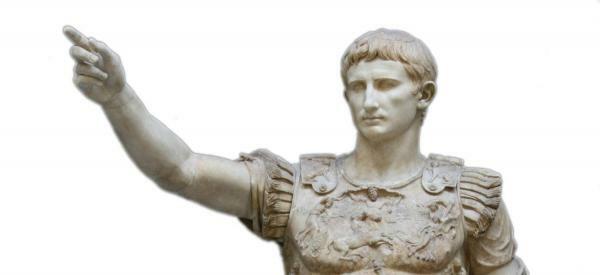
Image: margheritafontanesi
Second Triumvirate.
We continue this short biography about Octavian, the Roman Emperor to talk about the Second Triumvirate.
After Octavian had been elected consul, Lepidus, another Caesarian leader, raised the need to form an alliance between Octavio, Marco Antonio and Lepido because even if the two were rivals, if they clashed often they would reduce Cesar's supporters significantly, potentially giving Cesar's assassins an advantage. In that meeting, they came to form a military dictatorship, which is what we know as the Second Triumvirate, whose main objective was to kill all the people who had some kind of relationship with Cesar's murder.
The strongest opponents they had to face were Marcus Junius Brutus and Gaius Cassius Longinus, Caesar's assassins who took over quite a bit of power in Greece. In this case, MArco Antonio and Octavio joined forces both having the largest Caesarian armies, 28 legions, which ended up defeating both Brutus and Cassius in the well-known Battle of Philippi, who ended up committing suicide before being able to surrender.
After taking down Cesar's killers, a new agreement, in this case territorial, was given again between the three generals, for the distribution of power, where Marco Antonio stayed with Egypt, receiving thus the eastern part of the empire, Lepidus was left with Africa and Octavian as leader of Hispania, Italy and the Gaul.
However, This relationship did not last long for the year 38 BC. C. they staged several battles between them, until reaching the point of being Marco Antonio in the East and Octavio in the West, because Lepido, in one of those battles, had to surrender to Octavio due to the superiority of the army.
For him year 33 a. C. we will find a motion of censure for Marco Antonio, who had been accused of being no longer Roman, but Egyptian.
The Marco Antonio War and his arrival in power.
The motion of censure provoked again a confrontation between Octavio and Marco Antonio, which ended with the end of the Roman Republic. The most important moment was the one that occurred on September 2, 31 BC. C., with the Battle of Accio, where most of the Egyptian fleet was practically destroyed, so it was impossible for them to attack Rome. Marco Antonio and Cleopatra managed to save themselves by fleeing to Alexandria, but Octavian did not give up his persecution and by August 1, 30 BC. C. enters the city, making so much Marco Antonio as Cleopatra will end up committing suicide.
From that moment on, Octavio started a political career again for he became a good citizen of Rome, returning, among other things, the powers to the Senate, which did not mean a loss of power, since as we all know Octavio, he was the most powerful man in all of Rome, since among other things he donated a large amount of coins to the city's public treasury (aerarium).
In 27 a. C. he was awarded the title of Augustus "illustrious" (that was related to religion) and the title of Princeps (prince) with which he would end up putting an end to the Republic. Little by little, Octavio, was seizing the power of the most dangerous Roman provinces, that is, those located on the borders of the The empire, commanded to be controlled by members he believed to be trusted, the rest continued to be controlled by the Senate.
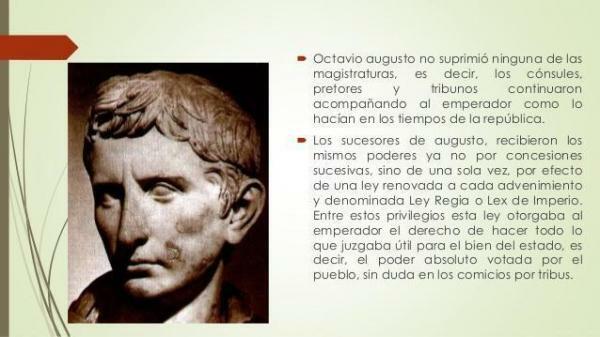
Image: Slideshare
Death of Octavio Augusto.
And we finish this short biography about Octavian, the Roman emperor to relate his death. It seems that Octavio Augusto throughout his life suffered various ailments, as it is said that he had a very fragile health, so it had moments of collapse. He recorded problems of arthritis, colds, typhus, eczema, ringworm, bladder problems, bronchitis, colitis... some of which eventually became chronic.
The truth is that for the year 23 a. C. This was about to pass away, and for that reason it was necessary for him to name who would be his successor. Among them was Marco Vipsanio Agrippa, one of the most faithful men of him, however, death in the year 12 a. C. he prevented him from ascending to power, so it was Tiberius Claudius Nero, son of his first marriage, who he ended up assuming the head of Rome.
Octavio Augusto, died in the city of Nola on August 19, AD 14. C. at the age of 76.
If you want to read more articles similar to Octavian, Roman Emperor - Biography, we recommend that you enter our category of Story.

